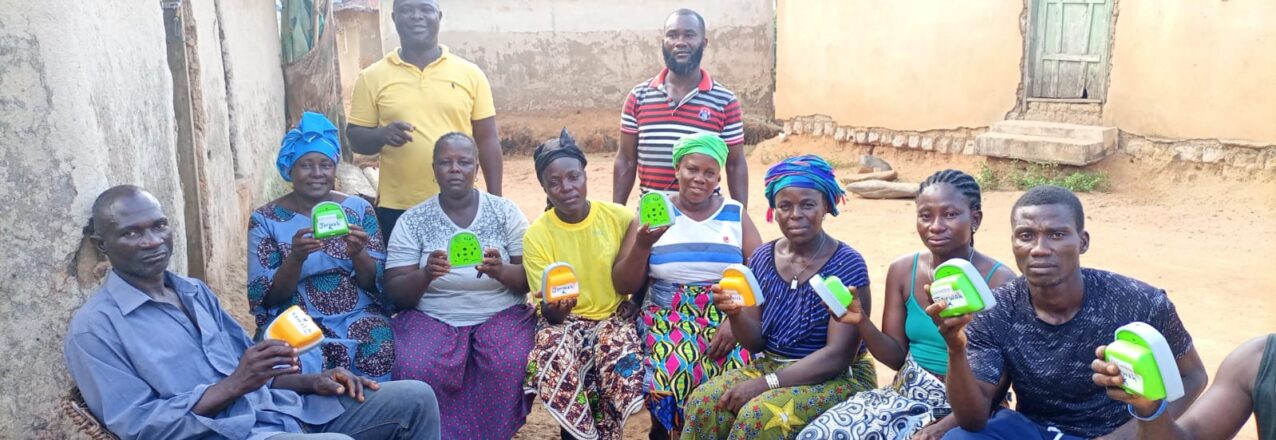In November 2021 a different kind of mobile library came to Bong County, Liberia. Through funding from USAID’s Land Evidence for Economic Rights, Gender, and Equality (LEVERAGE) Activity and in partnership with Landesa, Talking Books are bringing information about the Land Rights Act, passed in 2018, to 31 rural communities in the Panta, Gahn, and Wrumah clans. Talking Books are simple, hand-held audio players that deliver audio messages in local languages to low-literacy populations in areas without consistent electricity and/or internet connection.
The passage of the Land Rights Act marked an important milestone for land rights in Liberia. The Land Rights Act provides for the first time a nationwide process for communities to legally certify and manage their customary lands. The Land Rights Act also strengthens rural women’s legal rights to access and manage land by recognizing women as community members, mandating that each community member be allocated land for housing and agriculture, and requiring equal participation by women in community land governance bodies. However, biased gender norms, widespread lack of knowledge about women’s land rights in Liberia, and gendered barriers to accessing information and services mean that women are often left out of decisions about land and are unable to exercise their land rights.
To address these issues, USAID is partnering with the NGO, Landesa, to pilot an information campaign using Talking Books to build awareness about women’s land rights in Liberia. USAID’s LEVERAGE program is distributing Talking Books to women-headed households, ethnic minorities, women’s groups, and youth groups. Each Talking Book contains eight pre-recorded “chapters” that explain the Land Rights Act in a variety of local languages and dialects using culturally relevant concepts. The chapters cover the basics of the Land Rights Act and other topics such as the steps that communities can take to map their lands and apply for a formal land certificate, how to create by-laws and committees to manage the land as a community, alternative dispute resolution, women’s legal land and property rights, and the differences between tribal certificates and deeds. The chapters teach the importance of, and the legal requirement for, equal representation of women on all land management committees. Messages also explain women’s and men’s inheritance rights and explain women’s and men’s land rights inside and outside of formal and customary marriages, consistently emphasizing the rights of women as citizens and community members.
Instead of attending a one-time community training session, people can listen to the messages on Talking Books at their own pace, as many times as they like, and while doing other activities. This flexibility is especially important for women who face additional constraints on their time, mobility, and access to information and public spaces. Listeners can also record their questions and comments about the messages on the Talking Books for LEVERAGE activity staff. Using Talking Books also enables women, men, and communities to continue to learn about their land rights during the COVID-19 pandemic when frequent large gatherings are not safe.
After listening to the Talking Books, communities hold a town hall meeting to discuss their questions with local land tenure experts. Town halls include separate sessions for women to raise their questions and challenges with land rights in a setting that is less public and less influenced by gendered dynamics of public speaking. Questions that community members raise during town halls and that they record on the Talking Books will inform segments of Landesa’s nationally broadcast Land Is Life radio show. The show features prominent Liberian personalities andlinks communities across the country to a national conversation on women’s land rights.
Bringing information on women’s land rights to women, men, and youth and fostering community conversations about women’s land rights at a time when Liberia’s communities are beginning the process of formalizing land rights and establishing community land governance bodies is critical. The LEVERAGE activity aims to increase women’s participation in land governance and supports their secure and equitable access to land according to the law.
Why Women’s Land Rights Matter
Ownership and control over assets are central to women’s economic empowerment and their ability to contribute to local, national, and global economies. For many women, the most valuable of these assets are the land and natural resources from which they earn a living, provide for their families, and invest in their communities. Through programs, partnerships, research and policy reforms, USAID is working on the ground to address the barriers women face to accessing and controlling land, as well as the benefits that secure land and resource rights bring to women, their families, and communities.


